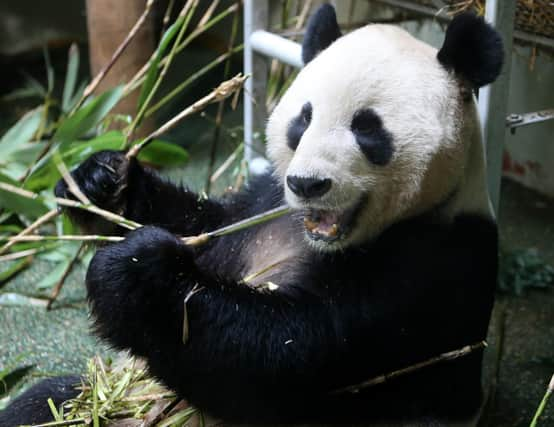Is there a chance of a rethink on departure of Edinburgh’s pandas? - Christine Jardine


It doesn’t seem like more than a decade since Yang Guang and Tian Tian arrived on a personalised freight jet at Edinburgh airport to an official welcome in December 2011.
Strange to think that the excitement which many regarded as an over-reaction we now recognise actually underestimated the impact the duo would have on the zoo, our city and more.
Advertisement
Hide AdAdvertisement
Hide AdWho could have imagined the excitement with which we would all wait and hope each year for a tiny addition to their family.
It was a popular joke for a year or two that there were more pandas in Scotland than Conservative MPs, and they certainly have attracted more popular support than most politicians.
So much so that a change of heart by the Chinese Government would be warmly welcomed.
There is no doubt that their departure will deprive us of tremendous ambassadors, able to connect a younger generation with nature and the conservation work done by the zoo.
And it is not like booking a Las Vegas residency.
You cannot just pick the next star of the animal world and bring them over in a blaze of publicity to do the same.
They would have to have that undefinable star quality which has set Giant Pandas apart since they became the symbol of the nascent World Wildlife Fund in 1961.
They are the superstars of the conservation world and replacing their drawing power will not be easy.
But while the fate of the species is now far more secure, having been removed from conservationists’ most endangered ‘red’ list, the future of the loveable duo themselves perhaps needs a little more consideration.
Advertisement
Hide AdAdvertisement
Hide AdBoth Yang Guan and Tian Tian are now, to put it kindly, past their prime in panda terms.
Edinburgh Zoo, its facilities and environment have become their home. What they are used to. The staff have become their friends.
They will miss each other, but for the pandas the break-up may be more traumatic, indeed damaging to both their physical and mental health.
It seems ironic that the creatures who have done so much to raise awareness of the man-made threat to nature should themselves be put at risk of suffering by moving them late in their lives.
Could the Chinese authorities yet be persuaded to think again?
We know that the contract, which was extended as a result of Covid, was expensive but it is not cost which is the defining factor. The conservation world and the contracts under which animals are accommodated in zoos have changed and the agreement under which they came here has not stood the test of time.
Ten years ago a donation to the Chinese Conservation Trust to promote and protect the species was acceptable.
Now organisations like Royal Zoological Society of Scotland , based at Edinburgh zoo, demands much more stringent conditions around conservation donations.
Advertisement
Hide AdAdvertisement
Hide AdThey need to know how, and how well, their money is being spent, and expect much more say to ensure that research is well directed than the Chinese organisation would be happy with.
But there is also a changed political climate to take into account.
We have always been aware that their presence here, as in any city which is ‘gifted’ pandas by the Chinese authorities, is about so much more than conservation.
They are the diplomatic currency of the Peoples’ Republic of China.
The pandas’ arrival in 2011 was to a Scotland preparing for a referendum and provoked some amusing political jostling over who would have seniority in the welcoming party.
And at the same time it seemed to reflect a new era of warmer relations with a post-Olympics China, opening up to the world.
Much of the shine has worn off the relationship since, of course. Optimism has been replaced by concern over democracy in Hong Kong, the treatment of Uighar Muslims and suspicions over the motives of various Chinese organisations in the UK.
It is perhaps no longer as politically acceptable to our own authorities to allow centre stage for a symbol of everything Chinese.
Advertisement
Hide AdAdvertisement
Hide AdBut part of the allure of the giant panda is the almost mythical stature created by the respect and value it is afforded in Chinese culture.
For the same reason it may be difficult to persuade that country’s authorities that they should end their lives here. That it would be better for both their physical and spiritual well-being.
But, there is, as they say, no harm in trying. So this week I have written to the consul to ask whether they might consider allowing the pandas to stay in the best interests of both their physical and spiritual well-being.
Over the years we have queued for hours to see them, marvelled at their cuteness and been frustrated by both their apparent laziness and the occasional tantrums from a grumpy Yang Guang.
During the pandemic they were central to calls as politicians rallied round to express support for the work of Edinburgh Zoo and the Royal Zoological Society.
Before their scheduled departure the zoo is planning a series of special events, some “Panda Magic Moments” to allow the public and RZSS members a last chance to see them and, almost certainly say farewell.
I will probably go at least once more. Just to enjoy looking at them and soaking in that special panda charm and loveliness.
For the zoo staff the parting when it comes will be particularly poignant but for Edinburgh it will be the end of a very special, deeply endearing relationship.
Christine Jardine is the Scottish Liberal Democrat MP for Edinburgh West
Comments
Want to join the conversation? Please or to comment on this article.